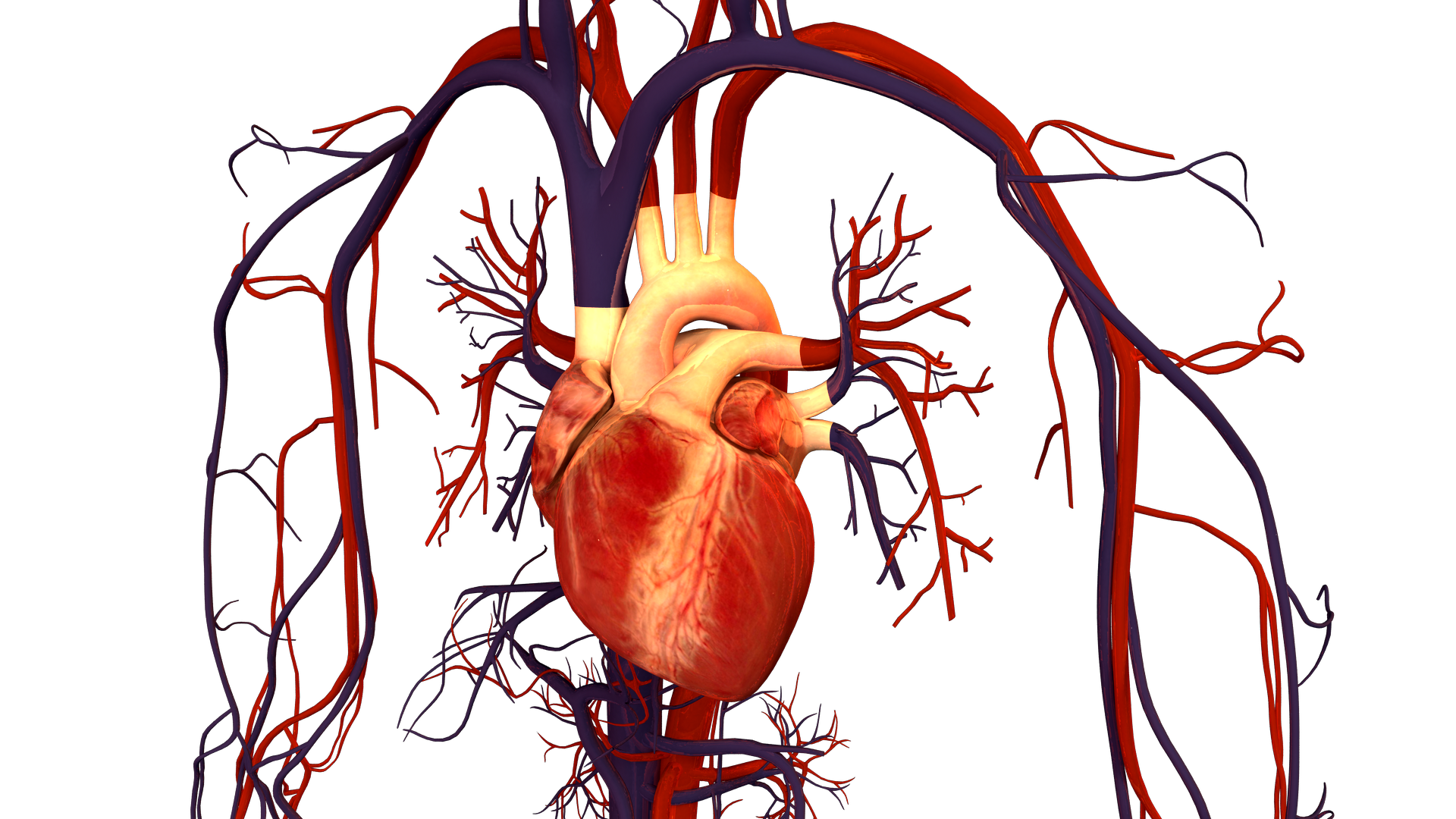Heart Disease or Cardiovascular Disease refers to various types of conditions that can affect heart function, for example :
Thank you for reading this post, don't forget to subscribe!-
- Coronary artery disease (atherosclerosis – ASHD) {affects the arteries to the heart}: The heart is like any other muscle in the body. It needs an adequate blood supply to provide oxygen so that the muscle can contract and pump blood not only to the rest of the body, it also pump blood to itself via the coronary arteries. These arteries originate from the base of the aorta (the major blood vessel that carries oxygenated blood from the heart) and then branch out along the surface of the heart. When one or more coronary arteries narrow, it may make it difficult for adequate blood to reach the heart; This can cause the heart muscle to ache like any other muscle in the body and provoke symptoms. The classic symptoms of chest pain or pressure and shortness of breath often spreads to the shoulders, arms, neck throat etc. This situation is called Angina Pectoris. When the coronary artery becomes completely blocked (due to a plaque that ruptures and causes a blood clot) blood supply to that part of the heart may be stopped; as the resulting piece of heart muscle starts to die. All this situation is called “Heart attack” or “Myocardial infarction”.
- Valvular heart disease (affects valve functioning to regulate blood flow in and out of the heart).
- Cardiomyopathy affects the heart muscles (squeezing).
- Heart rhythm disturbances (arrhythmia) affect electrical conduction.
- Heart infections where the heart has structural problems that develop before birth.
Classic signs and symptoms:
-
- Chest pain (angina) – This pain may radiate or move to the arm, neck, abdomen, neck, jaw, throat, back and even sometimes to testicles.
- Shortness of breath.
- Sweating.
- Nausea.
- Irregular heartbeat (arrhythmia).
- Chest tightness squeezing burning sense of discomfort.
- Pain may be accompanied by nausea or indigestion sweating lightheadedness fatigue.
- Sometimes it is hard to determine for the patient, where the pain is exactly coming from.
Diagnosis:
Coronary heart disease or Cardiovascular disease is initially diagnosed by patient history, physical examination, EKG/ECG, blood tests, Ultrasound, MRI, CT-scan and X-ray to image the arteries and heart muscle to confirm the diagnosis.
Palpate. (feel) for the pulses in the wrists and feet to see if they are present and if they are normal in their amplitude and force. Lack of pulses may signal a narrowed or blocked artery in the arm or leg. If one artery is narrowed, perhaps others, like the coronary arteries in the heart, also may be narrowed.
Auscultating or listening to the neck, abdomen and groin for bruits. A bruit is a sound produced within a narrowed artery due to turbulence caused when decreased blood flow occurs across the narrowed area. Bruits can be heard easily with a stethoscope in the carotid artery in the neck, the abdominal aorta, and the femoral artery. Check sensation in the feet for numbness, decreased sensation, and peripheral neuropathy.
Risk factors:
Atherosclerosis is the term that describes this condition. Cardiovascular disease, peripheral artery disease, and stroke share the same risk factors, a patient who is diagnosed with one of the three has an increased risk of having or developing the others.
Factors that put patients at increased risk are :
- Smoking
- High blood pressure (hypertension).
- High cholesterol
- Diabetes
- Family history of heart problems, especially heart attacks and strokes
- Obesity
Causes of Heart Disease or Cardiovascular Disease (CVD) :
Smoking, along with poorly controlled hypertension (high blood pressure), and diabetes, causes inflammation and irritation of the inner lining of the coronary arteries. Over time, cholesterol in the bloodstream collects in the inflamed areas and begin the formation of plaque. With time, this plaque grows and it does the diameter of the artery narrows. When the artery narrows by 40% to 50%, blood flow is decreased enough to potentially cause the symptoms of Angina Pectoris/Cardiovascular disease.
In some circumstances, the plaque can rupture or break open, leading to the formation of a blood clot in the coronary artery. This clot can completely occlude or block the artery. This prevents oxygen-rich blood from being delivered to the heart muscle beyond that blockage and that part of the heart muscle begins to die. This is a myocardial infarction or heart attack.
If the situation is not recognized and treated in time, the affected part of the muscle cannot be revived. It dies and is replaced by scar tissue. After some time this scar tissue decreases the heart’s ability to pump effectively and efficiently and lead to Ischemic cardiomyopathy.
Heart muscle that lacks adequate blood supply also becomes irritable and may not conduct electrical impulses normally. This can lead to abnormal electrical heart rhythms (Arrhythmia) including ventricular tachycardia and ventricular fibrillation. These are the heart arrhythmias associated with sudden cardiac death.
Treatment for Heart Disease or Cardiovascular Disease (CVD) :
Treatment for coronary heart disease depends upon its severity. Many times lifestyle changes such as eating a heart-healthy diet, exercising regularly, stopping smoking, and treating high blood pressure, high cholesterol, and diabetes may limit artery narrowing.
In some people, surgery or other procedures might be needed.
Allopathic treatment includes :
- Aspirin may be used for its antiplatelet activity. The decision to use aspirin routinely depends upon whether other risk factors for heart disease are present.
- Medications may be prescribed in patients with heart disease to maximize blood flow to the heart and increase the efficiency of the pumping function of the heart.
- Beta-blocker medications help block the action of adrenaline on the heart, slowing the heart rate. These medications also help the heart beat more efficiently and decrease the oxygen requirements of the heart muscle during work.
- Calcium channel blockers, help the heart muscle contract and pump more efficiently.
- Nitrates help dilate arteries and increase blood flow to the heart muscle. They are short-acting to treat acute angina symptoms and are long-acting preparations that may be prescribed for prevention.
- Sometimes for stenosis/narrowing of the coronary arteries, angioplasty and/or stenting may be considered to open the blocked areas. These procedures are performed in conjunction with cardiac catheterization. Depending upon the patient’s anatomy and the extent of the blockage present, coronary artery bypass graft surgery (CABG).
- If a stent is placed, other antiplatelet medications like clopidogrel will be prescribed for the rest of your life.
In my (Dr Qaisar Ahmed) opinion, treatment – is to remove disease/abnormality from the organism; Take drugs for a lifetime, it’s not treatment but addicting someone.
Homeopathic treatment for Heart Disease or Cardiovascular Disease
In Homeopathy Angina is classified into three main types :
- Stable angina
- Unstable angina
- Prinzmetal’s angina
Stable angina :
When there is no change in frequency, duration and precipitating factors, mostly symptoms occurs during exertion and last for less than five minutes and are relieved by rest.
Unstable angina :
In unstable angina symptoms are more severe, angina of effort with increasing frequency and duration, provoked by less than usual stimuli and occurs at rest.
Prinzmetal’s angina :
Prinzmetal’s angina almost always occurs when a person is at rest, usually between midnight and early morning. These attacks can be very painful. Prinzmetal’s angina is rare, representing about two per cent of cases of angina.
Here are some medicines for cardiomyopathy/angina :
Aconite :
A sudden attack of angina with acute pain in the region side of the chest, arm and shoulder, pulse full, hard, and bounding, a great palpitation, much restlessness with obstructed feeling in the chest. Cough may also be associated with angina.
Aconite is especially useful during an attack of vaso-motor angina from exposure to cold, with intense anxiety. Coldness pain radiating from the head in all directions, with numbness, tingling, paraesthesia.
Bryonia Alba :
Pains are stitching and tearing in the region of the heart, aggravated by motion, better by rest and lying on painful side.
Digitalis :
Sensation as if heart would stop working, condition worse by motion. The pulse is slow.
Lachesis :
Shooting type of pain in the heart left side of chest and left arm.
Crataegus :
Pain in the region of the heart, and under the left clavicle. Pulse, feeble, accelerated and irregular, Cyanosis of fingers and toes.
Glonoinum :
Violent heartbeat as if it would burst, pain radiates in all directions, throbbing all over the body.
Gluonium’s grand characteristic is throbbing all over the body in every vessel, feeling of fullness in the region of heart, sharp pains radiating in all directions from heart, laboured breathing, and fluttering of the heart, the heart feels contracted.
Amyl nitrate :
Tachycardia, feeling of a band around the head; oppressed breathing with constricted feeling about the heart, face flushed with anxiety and apprehension.
Its action is to produce a speedy dilation of the capillaries in the upper part of the body. It is very useful in relieving the paroxysm.
Naja :
Severe pain in the heart region – extending to the nape of the neck, pulse slow and irregular with fluttering and palpitation.
Secale cor :
Angina pectoris results due to spasms or constrictions of the coronary artery.
Spigelia :
Shooting, stabbing pain with pressure and oppression in a chest down the left arm. Acts well in smokers and drunkards. Is a useful remedy in anguishing substernal pain which radiates to the neck and arms, irregular pulse, the tendency to syncope, palpitation and sharp stitches in the heart, pulse weak and irregular, or full and bounding with aggravation from the least motion.
Arsenic album :
Remarkable remedy for angina pectoris, violent throbbing in the heart when lying on back, aggravation after midnight. Arsenicum Album has also proved useful, especially in preventing paroxysms.
Cimicifuga :
Heart action suddenly ceases with severe pain in the heart region, pulse weak. Pains radiate all over the chest and a sensation as if the left arm were bound to the side; The patient may become unconscious, the heart’s action suddenly ceases, sense of impending suffocation, the pulse is feeble.
Cactus :
Excellent remedy of the cases of angina pectoris, constriction and congestion of the heart, marked palpitation with prostration.
Veratrum album :
Poor heart action in tobacco chewers, much palpitation, anxiety and rapid respiration.
Lilium tig :
Angina pectoris with pain in the right arm, pulsation all over the body, the patient feels suffocated.
Argentum Nitricum :
Angina pectoris where complaints occur after taking a meal.
Ammonium carb :
Complaints occur after a long-continued illness.
Strophanthus :
Angina pectoris due to heart weakness.
Angina and all other Heart diseases are completely Curable in Homeopathy. Anybody who wants to visit my clinic, learn and/or order medicine (courier) please send your details/address at Whatsapp- +923119884588.
P. S : This article is only for doctors having good knowledge about Homeopathy and allopathy, for learning purpose(s).
For proper consultation and treatment, please visit our clinic.
Location, address and contact numbers are given below.
NoN of above mentioned medicine(s) is/are not the full/complete treatment, but just hints for treatment; every patient has his own constitutional medicine along with these mentioned above.
To order medicine by courier, please send your details at WhatsApp– +923119884588
 Dr. Sayyad Qaisar Ahmed (MD {Ukraine}, DHMS) ; senior research officer Dnepropetrovsk state medical academy Ukraine; is a leading Homeopathic physician practicing in Al-Haytham clinic, Umer Farooq Chowk Risalpur Sadder (0923631023, 03119884588), K.P.K, Pakistan.
Dr. Sayyad Qaisar Ahmed (MD {Ukraine}, DHMS) ; senior research officer Dnepropetrovsk state medical academy Ukraine; is a leading Homeopathic physician practicing in Al-Haytham clinic, Umer Farooq Chowk Risalpur Sadder (0923631023, 03119884588), K.P.K, Pakistan.
Find more about Dr. Sayyad Qaisar Ahmed at :
https://www.youtube.com/Dr Qaisar Ahmed

Comments are closed.